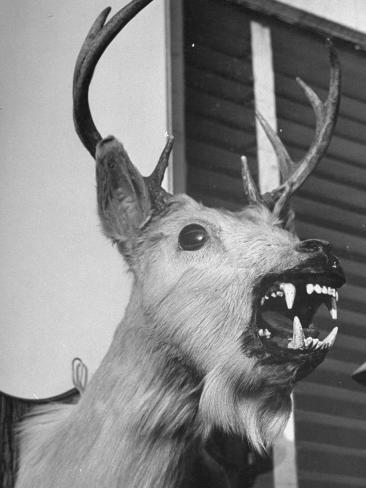They came that
night. Rotten maws full of needle-like teeth; dried matted fur and hollow eyes.
The sound of their hooves tapping in the dirt and stone path announced their
presence. One snorted and sniffed the air.
Clip-clop
Clip-clop
The sound used to herald
wellness and prosperity. Mules used to truck bundles of goods here and there for the people of the town and
horses clambered up the street with passengers in tow, heading for far off
towns. No one here used to fear the night as they do now. Children could play
in the streets until the moon rose high in the sky. Now only the soft whisper
of the breathing caribou and the tap-tap-tapping of their hooves filled the
night. The townspeople huddled in their homes, trapped within them until dawn burned
away the darkness. A curtain twitched, just barely, as someone watched silently
from the window. They made a terrifying scene, the reindeer. A dark, huddled
mass, full of flesh-ripping teeth and topped with horns moved through the town,
scouring for any soul unlucky enough to be caught out after dark.
It hadn’t always
been like this. When the town was new and the settlers staked their claim over
the land once held by another people, now dispossessed and transient, the reindeer
stayed far away. Then the land was beautiful. The water ran clear and the trees
grew high and the wildflowers grew so numerous they blotted out the tender
green grass in the fields. Only after the land had been swallowed by its new
masters, its rivers sullied and the trees cleared, did it change. The earth
grew sick and, like antibodies, the reindeer appeared.
They were dumb,
vicious brutes. They could rip a man’s arm clean off and leave him for dead. In
a herd they could trample a house and a swift kick could kill a child. They
were oversized, with bloated stomachs hanging low and full of meat. Their
shoddy appearance disguised their agility. Appearing each night only the vanish
with the sun, the reindeer now ruled the town. In the early days of their
arrival they ran many men down – men who had sworn to capture them and kill
them. Few were able to do so. The reindeer’s thick hide left it nearly
impervious to damage and its short temper made it a fierce foe. Too often the
town’s hunters became the hunted until they thought it best not to further
disturb the beasts but to let them pass.
The great beasts
became more reckless with time. As the town killed more and more animals for
food and dumped more and more of their waste into the water, and threw more and
more of their garbage into the surrounding area, the reindeer multiplied. What
started as a small group – four or five individuals – was now a full blown
legion. Now, their presence weighs like a stone around the neck of the town.
Little recourse is available to the people who once called this living
nightmare their home. Now, people pack their things and leave.
Clip-clop
Clip-clop
The sound now
heralds an exodus from the town, now claimed by the ravenous reindeer. Each
family, tired of living in fear, now moves on to greener fields, ones not yet
infested with the flesh-devouring monstrosities of the night. Some believe this
to be the ultimate end of the reindeer, as ghastly retribution for an Earth mistreated.
As mother nature was wronged so mother nature sets the score even.
The old town,
littered now with garbage which blows between dilapidated houses, stands empty,
a testament to the culture which had once claimed it. The reindeer, they say,
have lost their teeth now. Without their human prey they have resorted to
feeding on the greens which grow lush in the fallow fields. As time wears on
and the traces of humans wear away, the reindeer grow fewer still. They now
seem as tame beasts, chewing their grass contentedly, drifting between the
trees. The memories of their vicious ancestors fade, as do the scars of a
neglectful town.
(a herd of reindeer)
Author's Note: This story was based just on a small tidbit from the Raven's myth. In it, vicious, sharp teethed reindeer kill and eat men for over-hunting in the area. The town's people are able to rid themselves of them by setting out very sour berries which cause their teeth to fall out. In my story, I capitalized on the idea of vicious, man eating reindeer and really focused on trying to describe them and the fear they were bringing to that town. In addition, I took out the part about the sour berries because I rather enjoyed the idea of mother nature retaining some kind of guard against more exploitative humans. I kind of think that if someone were to move back into the area and mistreat it, then the reindeer would regrow their sharp teeth and start eating people again.
Myths and Legends of Alaska, edited by Katharine Berry Judson (1911)



